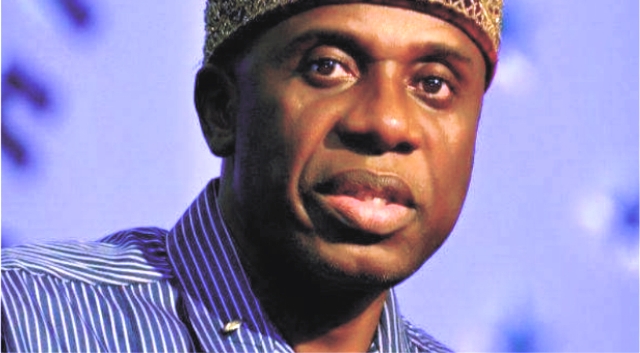Opinion
Amaechi’s Scorched-Earth Politics (11)

It is fair to say that as former Governor, Amaechi
laid Rivers State to waste on the back of a dubious pan-Nigerian agenda, with revenue in excess of three trillion naira, Rivers State as a crippled financial entity should have been the stuff of fantasy only, comparable to filling Helm’s Deep on a palm, even for an artful reverse alchemist. But evidence on the ground belied such riches and it beggars belief that state with such vast resources was unable to perform the most ordinary duties including payment of salaries.
Basic infrastructure in Port Harcourt, not the least roads, was disgraceful, as much as anything else state-wide, as everyone cast envious glances at Uyo, Akwa Ibom State, with a rueful sense of what might have been.
But whilst he wrought economic and social havoc at home, Amaechi was occupying himself with a bewildering projection of power well outside his mandate as governor, which entailed a massive expropriation of Rivers resources in a slavish splurge that also played a pivotal role in President Jonathan’s takedown.
That twin act of heresy invited a sense of affront from a people who had long despised Amaechi and his brand of politics in a country where they had borne the weight of the oppressive majority’s “politics of competitive ethnicity”, to quote Ken Saro-Wiwa.
People pondered the existential implications of Amaechi’s extraordinary betrayal for, as Walter Rodney explains, power determines “the extent to which a people survive as a physical and cultural entity”. But Amaechi was throwing his own people to the dogs instead.
To put it in context, besides Governor Nyesom Wike’s endearing gravitas and common touch, the people additionally embrace him because he symbolises the constant in their bruised ethos. That constant is a sense of profound injustice and the concomitant pushback against the perpetrators for whom Amaechi is seen as an agent. This visceral negativity towards Amaechi found loud expression in the outpouring of jubilation across the Niger Delta when the Supreme Court upheld Governor Wike’s election.
This is the unflattering backdrop to the 2015 general elections and 19th March legislative rerun elections in the state which Amaechi’s contrived bravado and media soundbites conceal. The 2015 gubernatorial contest between Wike and Petersisde was a veritable match-up between the Giant and a Lilliputian. Besides the daunting electoral headwind that Peterside faced as Amaechi’s protege, he also personally shares his master’s major flaws in his unrestrained penchant for hubris and high-flown demagoguery while lacking any meaningful grassroots ability. Only people who specialise in high farce gave him a fighting chance.
Former governors Peter Odili and Celestine Omehia have noted in their respective books that Amaechi doesn’t reckon with compunction. Yet, his savage inveighing of the justices of the Supreme Court over the 27th January judgment is astonishing and an irony reminiscent of Mary Shelly’s Frankenstein’s monster. It was the same court that made him governor when it declared him ‘winner’ of an election he never even contested!
Prof. Ben Nw bueze has argued that Amaechi’s inauguration as governor on October 26, 2007 without contesting an election amounted to an unconstitutional takeover of part of government of Nigeria, contrary to section 1(2) of the constitution. In plain terms, a coup! As Supreme Court judgments go, that which appointed Amaechi as governor stands alone as an oddity. Yet, no one cooked up conspiracy theories.
The 27th January Supreme Court decision on the Rivers State governorship election, in contrast, was well reasoned, being predicated on existing legislation and the finer principles of precedent. Shorn of the scripted bedlam by Amaechi and his party, the judgment merely confirmed what Prof. Attahiru Jega, then INEC chairman, had said all along, namely that the governorship election was credible.
In the final analysis, however much an orchestrated media love-in tries to airbrush Amaechl, home is where the proof of the pudding is. For a man who seemed to pride himself on his Machiaveilian instincts, Amaechi fell from grace by not heeding one of Machiavelli’s most important advice in The Prince — that the leader who owes his power to “the favour of the nobles” should, before anything else, try to “win the people over”. Amaechi never did that, and he is discovering that treachery has a price.
Bob, a lawyer, wrote in from Abuja.
Solomon Bob
Opinion
Policy Intervention: More Than Administrative Reform

Opinion
Redefining New Year Resolutions

Opinion
Trans-Kalabari Road: Work In Progress

-

 News6 hours ago
News6 hours agoSERAP Sues Govs, FCT Minister Over Security Vote Spending
-

 News6 hours ago
News6 hours agoAkande Proffers solution to insecurity in Nigeria
-

 Sports4 hours ago
Sports4 hours agoMan of The Match award Excites Nwabali
-

 Sports4 hours ago
Sports4 hours agoTinubu Lauds Super Eagles’ after AFCON bronze triumph
-

 News6 hours ago
News6 hours agoRSG Sets Up Panel To Investigate Alleged Extortions At College Of Nursing Sciences
-

 Sports3 hours ago
Sports3 hours agoAFCON: Lookman gives Nigeria third place
-

 Niger Delta5 hours ago
Niger Delta5 hours agoINC Polls: Ogoriba Pledges To Continuously Stand For N’Delta Rights … Picks Presidential Form
-

 Sports4 hours ago
Sports4 hours agoFulham Manager Eager To Receive Iwobi, Others

